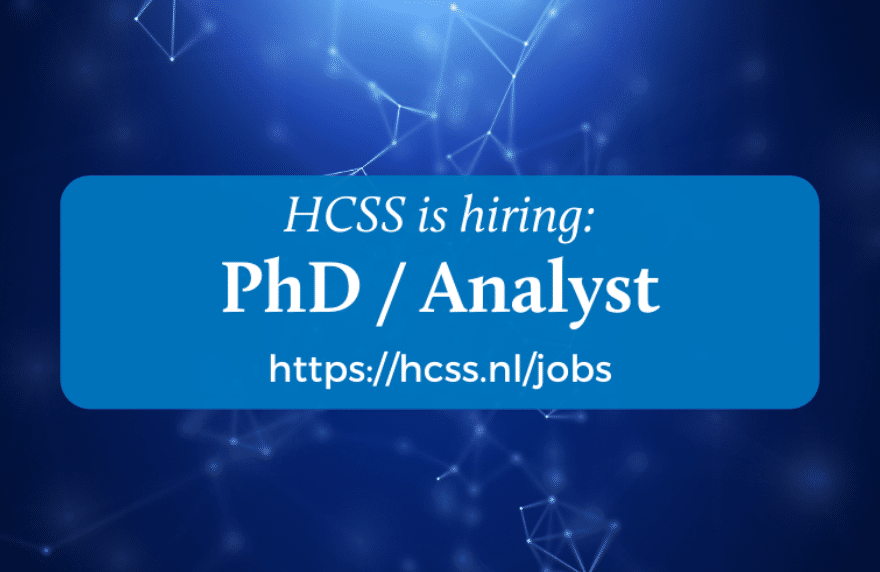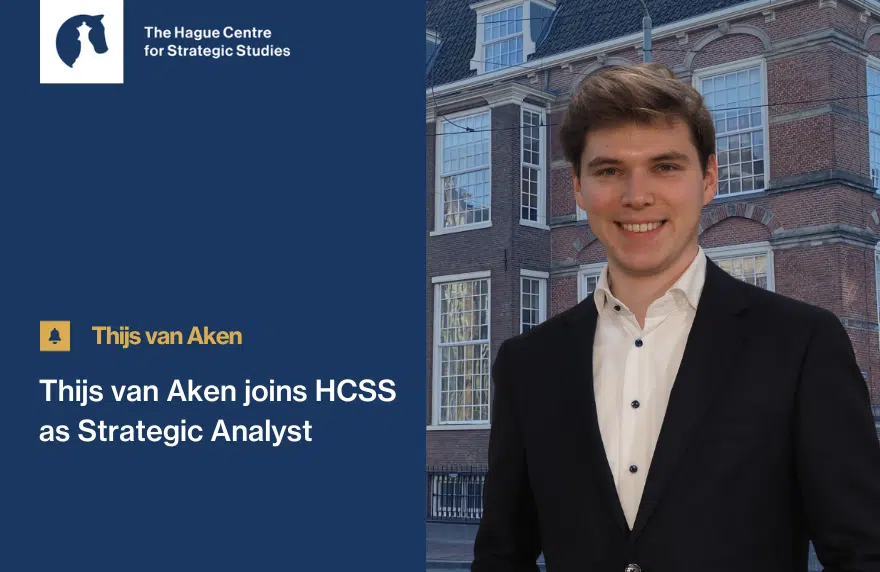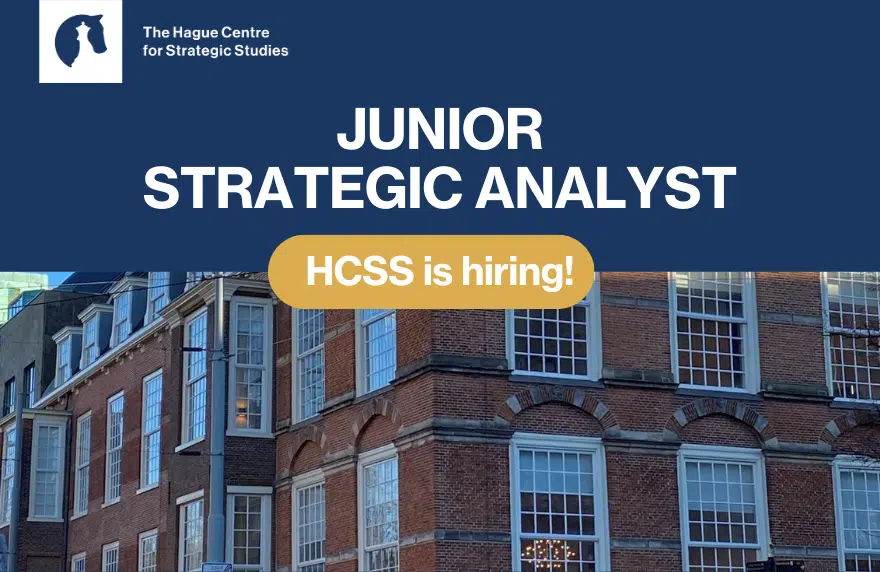The Hague Centre for Strategic Studies (HCSS) is developing advanced real-world policy applications to help solve urgent societal challenges. With our team of interdisciplinary analysts from the world’s leading universities, we develop a portfolio of top-notch, data-intensive, quantitative, and causal political risk models. Our data lab hosts and hones our capability for the analysis, modelling, and computation of relevant political, security and conflict risk metrics, as well as our competencies for formulating and implementing appropriate risk measures.
In collaboration with the Leiden Institute of Advanced Computer Science (LIACS), HCSS is offering a paid PhD position. As part of his/her PhD research, the PhD candidate will work on the development, validation and deployment of a set of predictive models of violent conflict that enable the optimization of the efficacy of causal interventions under a range of causal, strategic, and political constraints using real world data. Alongside the PhD research, the PhD candidate will apply these models to help solve real world problems confronted by Dutch foreign and security policymakers, including climate security. Following the successful completion of the four-year project, the candidate will have earned a PhD and gained valuable professional experience in solving urgent public policy challenges.
The PhD candidate will be supervised by Professor Dr. Thomas Bäck, head of the Natural Computing Research Group at LIACS, Assistant Professor Dr. Anna Kononova (LIACS), and Dr. Ninoslav Malekovic, Chief Data Scientist at HCSS.
Requirements
Candidates should have a MSc Degree in computer science, mathematics or statistics and demonstrated affinity for solving quantitative problems. He/she should also demonstrate strong transferable, programming skills, as well as a keen interest in public policy research.
Our candidate meets the following criteria:
- MSc degree in one of the following disciplines: computer science, mathematics, statistics.
- Strong experience in data science, machine learning, artificial intelligence and/or optimization
- Fluency in at least two of the languages: R, Python, Scala, Julia, Java, C#, and/or C++
- Prior experience with dashboarding, visualization, and/or web design and development
- Prior experience in software development and engineering is a strong plus
- Data management and engineering skills
- Very good communication skills in English, both orally and in writing
- Ability to work independently in a fast-paced environment
- Strong work ethic and willingness to learn
- An affinity for international policy research
- The ability to interpret data
- First-principles thinking
Successful applicants will be asked to provide a certificate of good conduct (‘Verklaring Omtrent het Gedrag’), which is available from The Netherlands Ministry of Justice.
Practical Information
The PhD/analyst position is paid. The PhD/analyst position is for four years. Alongside the PhD research, the PhD candidate will contribute to the application of the models to real world policy problems in the context of HCSS work for clients.
Application Procedure
Your application should be in English. We will only consider complete applications. To apply, send the following items to info@hcss.nl, using ‘PhD Role 1/2021’ as the subject line:
- A cover letter, succinctly explaining why you are the best candidate for the PhD role
- A portfolio of previous data projects, including the code (or a GitHub address)
- A summary of the initial research proposal (1 page maximum)
- A resume, including a list of references
- Official academic transcripts
- One writing sample
Eligible applicants will be invited for an interview.
Applicants are invited to submit their application before 30 January 2021. Interviews will be held in February. The selected PhD candidate is expected to start from 1 March 2021 onwards.
Download: Annex to the HCSS-LIACS PhD Vacancy
About HCSS
The HagueCentre for Strategic Studies is an independent think tank that provides strategic advice to governments, non-governmental organizations and corporations. We provide practical solutions for challenges in a fast-changing world. Our multidisciplinary research agenda covers international and national security, defense planning, cybersecurity, resource and energy issues, and broader geopolitical and geo-economic developments. We conduct our research guided through innovative and data-driven approaches. HCSS works independently and in collaboration with its network of affiliated experts. HCSS is based in The Hague, the Netherlands, the international city of peace and justice, where the International Court of Justice and the International Criminal Court are located. The Hague has a large expat community, as the city is home to many international organizations, NGOs, and academic institutes. It is also the seat of the Dutch government and Ministries of Justice and Security, Foreign Affairs, and Defense, which are important clients of HCSS.
About LIACS
The Leiden Institute of Advanced Computer Science is the Artificial Intelligence and Computer Science Institute in the Faculty of Science of Leiden University. We offer courses at the Bachelor and Master of Science level in Artificial Intelligence, Computer Science, ICT in Business, Media Technology, and Bioinformatics. According to an independent research visitation, we are one of the foremost computer science departments of the Netherlands. We strive for excellence in a caring institute, where excellence, fun, and diversity go hand in hand. We offer a clear and inviting career path to young and talented scientists with the ambition to grow. For more information about LIACS, see http://liacs.leidenuniv.nl.
Annex to the HCSS-LIACS PhD Vacancy (January 2021): An outline of the problems to be solved in the PhD project in application domain terms
The Hague Centre for Strategic Studies (HCSS) develops conflict and security policy modeling applications. We use causal modeling to identify and estimate causes of violent political conflicts. For example, in our ongoing award-winning, “Water, Peace, and Security” project, we identify and estimate causal effects of water, food, energy, and climate risks on violent political conflicts. Our effort to casually model violent conflict is also intended to generate a taxonomy of different pathways to violent conflict. Moreover, we use causal modeling to specify and optimize efficacy of causal interventions into such conflicts. Hence, our objective is dual: First, we want to get a better grip on causality in complex social systems. Second, we want to assess how policymakers can optimally intervene into causes of distinct types of violent conflicts.
Along these lines, we want to develop, validate, and deploy causal models that identify and estimate different natural conflict pathways using existing domain knowledge. At the same time, we want to optimize the efficacy of interventions into causes of violent conflicts under a host of causally relevant constraints. Some of these constraints are natural while others are derived from policy.
In this latter context, we assess how to inoculate a causal intervention into a violent conflict against attacks that are intended to deprive the intervention of its efficacy. Our objective is to optimally trade the intervention’s efficacy for its resilience to being strategically contested. We are subjecting the optimization of the intervention’s efficacy to strategic interaction among adversarial policymakers.
Furthermore, we analyze how to inoculate a causal intervention into a violent conflict against voting and agenda attacks that are intended to deprive the intervention of its efficacy. Our objective is to optimally trade the intervention’s efficacy for its political feasibility. Not only are we subjecting the optimization of the intervention’s efficacy to the policymakers’ strategic interaction, but also to the intervention’s dependence on the tally of policymakers’ votes. Specifically, by formulating the intervention as one of several interventions on a governing body’s voting agenda, we are embedding the strategic interaction-related constraints into the governing body.
Finally, solutions to the above problems apply optimization to causal modeling of conflict. Validation of such solutions requires causal models of several conflict pathways to be identified and estimated, before the efficacy of a causal intervention into each of these conflict pathways can be respectively specified and optimized.
Therefore, the doctoral research should result in detection of causal pathways that lead to a violent conflict in complex social systems, optimization of causal interventions into such pathways, as well as their optimization in the light of adversarial strategies. Thus, the scientific contribution to be made requires expertise in causality, optimization, and conflict modeling.








